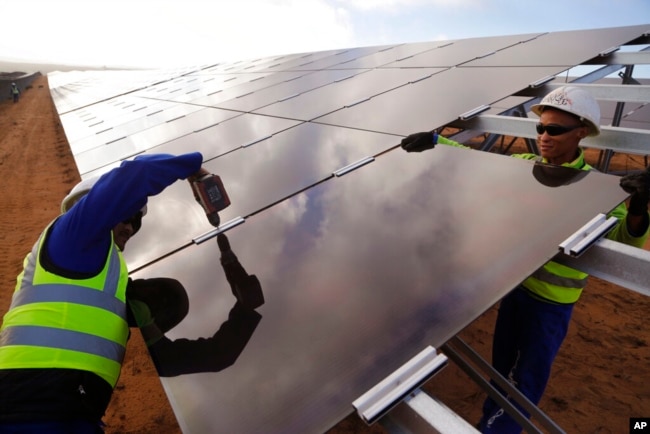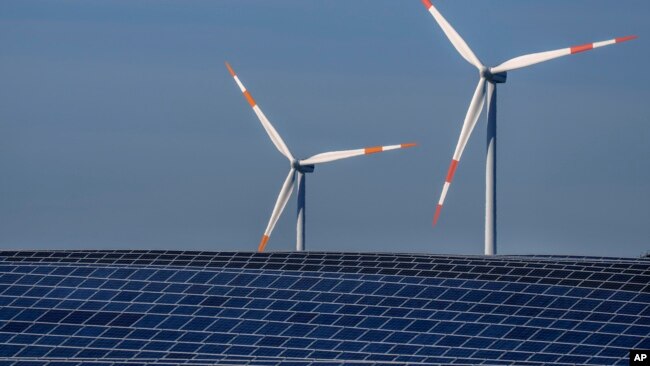Is there still HOPE?
“doom-ism” 確かに!! その方が楽ですよね!!
どうせ・・・なのだから..........
世の中、こう言った物事が結構多いのも事実。
多くの気候科学者の弁が載せられていますが、あなたはどうお考えですか?
戦う?諦める?
VOAで英語を学び、気候問題を考えてみましょう!!
気候科学者たち 希望はある(和訳)
Climate Scientists: There Is Hope
April 08,2022
最近の科学的な報告は、気候変動の破壊的な影響を示していますが、多くの科学者は、前向きに考えることが重要だと言っています。世界があきらめずに変化し続ければ、気候変動の最悪の影響をある程度は防ぐことができるのです。
しかし最近、多くの科学者が気候変動に対する破滅感、つまり "ドゥームイズム "と向き合っています。
ジャクリン・ギル氏は、メイン大学の気候科学者です。彼女は2018年ごろ、こうした "ドゥーマー"、つまり地球を救うことは絶望的だと考える人たちが増えていることに気づいたと言います。彼らは自分の行動を変えることを拒み、気候変動を防ぐためにどう動けばいいのかを考えようとしないのです。
スーザン・クレイトン氏はウースター大学の心理学教授で、気候変動の恐怖を研究しています。
彼女は、”破滅主義”とは、「...どうせ私には何もできないのだから、わざわざ変化を起こす必要はない」という言い方をすることだと説明しています。
彼女は他の6人の気候科学者とともにAP通信の取材に応じました。彼らは、排出ガスによる気候への害が増加しているにもかかわらず、状況は絶望的ではないと言います。私たちはまだ、最悪の事態を防ぐことができるのです。
国連の気候変動に関する政府間パネル(IPCC)は最近、第3次報告書を発表しました。この報告書では、石油や石炭といった伝統的な燃料の燃焼がもたらす被害について説明されました。伝統的な燃料への新たな投資や農業のための森林の除去が、世界が気候変動を止めるための変化を妨げているのです。
インガー・アンダーソン氏は、国連の環境プログラム・ディレクターです。彼女は、気候の危機が迫っているからこそ、人々に行動を起こしてもらおうと努力しているのだと言います。その目的は、人々を脅して何もさせないようにすることではありません。
「私たちは絶望的な状況にあるわけではありませんが、迅速な行動が必要不可欠です。行動が遅れるごとに、気候変動はより複雑で高価になり、克服するのが難しくなります」とアンダーソン氏は述べています。
国連IPCC報告書は、炭素汚染を削減するための迅速かつ極端な対策がなければ、世界の温暖化を1.5℃に抑えることはできないと述べています。地球の気温はすでに1.1度上昇しています。1.5度以降、気候変動は急速に悪化し、環境は危機にさらされます。気象災害も増加します。
ジェームズ・スキア氏は、国連IPCC報告書のリーダーです。「1.5度では崖っぷちにはなりません。たとえ1.5度を超えても、絶望に手を上げることにはならないのです。」と同氏は語ります。
マイケル・マン氏はペンシルバニア州立大学の気候科学者です。科学者たちは、排出量のバランスを取った後も、地球は何十年も温暖化し続けると考えていたといいます。排出量をゼロにするということは、海や森林が除去できる以上の炭素を大気中に作り出さないということです。新しい研究によると、排出量のバランスを取った後、大気中の炭素濃度を下げるには数年しかかからないと言います。
「科学者が実際に言ったことは、1.5度の温暖化を避けるためには、この10年間で炭素排出を50%削減する必要がある、ということです。2度の温暖化は1.5度よりはるかに悪いですが、文明の終わりというわけではないのです。」とマン氏は言います。
気候変動を否定する人々や企業の多くは、人々に何もできないと思わせています。
気候破滅運動のリーダーの一人がガイ・マクファーソン氏です。
マクファーソン氏は環境科学の教授を退職した人物です。彼は、お金も含め、現代の助けを借りずにシンプルに生きています。彼は、2026年までに気候変動が人類を滅ぼすと主張しています。しかし、AP通信とのインタビューでは、北極の夏の海氷が失われるため、2030年頃に人類滅亡が起こる可能性があると述べています。
ジェニファー・フランシス氏は、ウッドウェルズ気候研究センターのリーダーで上級科学者です。彼女は、2050年までに北極の氷がなくなるとしても、マクファーソン氏は破滅を誇張していると言います。
北極圏に住む人々が最も影響を受け、それ以外の人々はより速い温暖化と海面上昇、そして激しい天候をより頻繁に目にすることになるでしょう。
夏に北極の氷が溶けるのを防ぐことはできませんが、フランシス氏は、多くのコミュニティが適応していくだろうし、排出量を減らすための新しい技術によって、より悲惨な状況を防ぐことはできるだろうと言います。
Climate Scientists: There Is Hope
Recent scientific reports show the destructive effects of climate change, but many scientists say it is important to remain positive. If the world continues to change and not give up, we can still prevent some of the worst effects of climate change.
Recently, however, many scientists are dealing with the feeling of doom about climate change or “doom-ism.”
Jacquelyn Gill is a climate scientist at the University of Maine. She says that around 2018 she noticed an increase in these “doomers,” or people who think that saving the earth is hopeless. They refuse to change their behavior or consider how they can work to prevent climate change.
Susan Clayton is a psychology professor at Wooster College and studies climate change fears.
She explains that “doomism” is, “… a way of saying 'I don't have to go to the effort of making changes because there's nothing I can do anyway.' "
She spoke to The Associated Press with 6 other climate scientists. They say that even though there is increasing harm to our climate because of emissions, the situation is not hopeless. We can still prevent the worst effects.
The United Nation's Intergovernmental Panel on Climate Change (IPCC) recently published its third report. This report explained the damage caused by the burning of traditional fuels, like oil and coal. New investments in traditional fuels and removal of forests for farming are preventing the world from making changes to help stop climate change.
Inger Anderson is the Environment Program Director for the United Nations. She says officials are trying to get people to take action because there is a climate crisis. Their goal is not to scare people into doing nothing.
"We are not doomed, but rapid action is absolutely essential. With every month or year that we delay action, climate change becomes more complex, expensive and difficult to overcome,” Andersen said.
The UN IPCC report stated that without fast and extreme measures to cut carbon pollution, the world is not likely to limit warming to 1.5 degrees Celsius. The global temperature has already increased by 1.1 degrees Celsius. After 1.5 degrees, climate change will quickly worsen causing environments to be in danger. It will cause an increase in weather disasters.
James Skea is a leader from the UN IPCC Report. "We don't fall over the cliff at 1.5 degrees. Even if we were to go beyond 1.5 it doesn't mean we throw up our hands in despair, " Skea said.
Michael Mann is a climate scientist at Pennsylvania State University. He says that scientists used to think Earth would continue to warm decades after we balance emissions. Balancing emissions to net zero means not creating more carbon in the atmosphere than oceans and forests can remove. New research suggests that it will only take a few years to decrease carbon levels in the air after we balance emissions.
“…by the time you're done, it's 'we're doomed' when what the scientist actually said was we need to reduce (our) carbon emissions 50 percent within this decade to avoid 1.5 (degree of) warming, which would be really bad. Two degrees of warming would be far worse than 1.5 warming, but not the end of civilization," Mann said.
Many of the people and companies that deny climate change cause people to think that nothing can be done.
One of the leaders of the climate doom movement is Guy McPherson.
McPherson is a retired environmental science professor. He lives simply without modern help, including money. He claims that climate change will destroy humans by 2026. But when speaking with The Associated Press, he said that the destruction of humans could occur around 2030 because of the loss of Arctic summer sea ice.
Jennifer Francis is a leader and senior scientist at the Woodwell’s Climate Research Center. She said that even though the ice in the Arctic will be gone by 2050, McPherson is overstating the destruction.
People who live in the Arctic will see the most effects and everyone else will see faster warming and rising sea levels as well as intense weather more often.
We cannot prevent the Arctic ice from melting in the summer, but Francis says that many communities will adapt, and we can still prevent more disastrous situations from happening due to newer technology to help decrease emissions.
Words in This Story
doom – n. a state of trouble or complete destruction in the future
emissions – n. gasses that are released into the atmosphere
essential – adj. necessary or extremely important
expensive – adj. worth a lot of money
Celsius – adj. a temperature scale based on units of 10. Zero is freezing and 100 is boiling for water.
cliff – n. an area of high land that hangs over
despair – n. a very negative feeling of sadness and misery
civilization – n. human society throughout history

